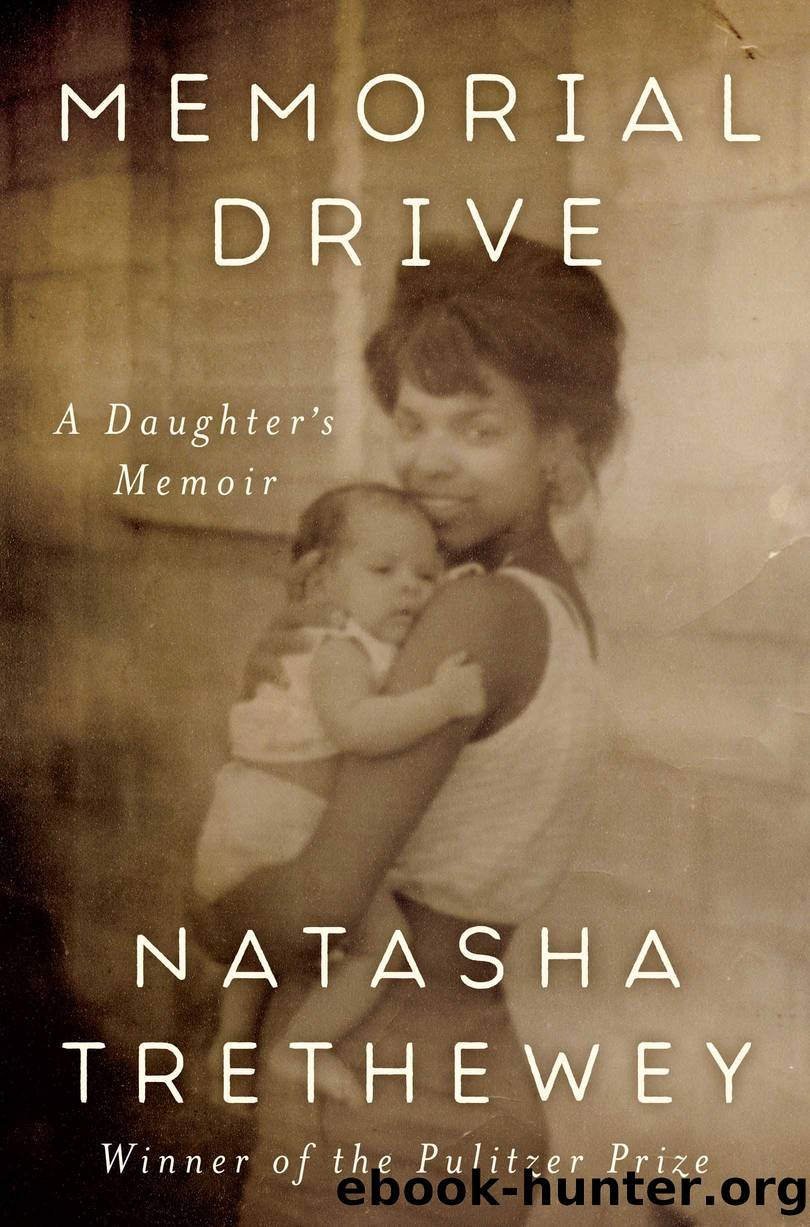Memorial Drive by Natasha Trethewey

Author:Natasha Trethewey
Language: eng
Format: epub, mobi
Publisher: HarperCollins
Published: 2020-05-09T00:00:00+00:00
7.
Dear Diary
TO BE BESIDE ONESELF, IN THE IDIOM, IS TO BE SO overcome with intense emotion, like grief or fear, as to feel outside one’s own body. Cognitive theorists suggest that speaking about trauma or writing about it may help heal the fissure in the fabric of selfhood brought on by the event. I think now that’s why my mother gave me the diary. She knew that I was hurting, that her situation had upset me; I had told her so.
In the aftermath of my knowing, the silence between us widened. Joel’s presence, his watchful eye, made it harder for us to interact as mother and daughter, and she and I were almost never alone. When Joel was around, I retreated to my room, where I turned the volume up on my record player, transforming the moves I learned in ballet and gymnastics classes into the language of interpretive dance routines I would perform at school. I danced again and again to Roberta Flack’s “The Impossible Dream” and Otis Redding’s “(Sittin’ on) the Dock of the Bay.” In Redding’s song, it was his melancholy that spoke to me, and the moment he sings “I left my home in Georgia,” I would imagine what it would be like to get away from where I was. It was as if, even then, I knew that getting away was something I would do alone, that it would mean being without my mother, the sadness of that.
“The Impossible Dream” became an anthem for me, these lines in particular: To fight the unbeatable foe / To bear with unbearable sorrow. . . . And later, To right the unrightable wrong. . . . To reach the unreachable star. I would lose myself in the music and these words, silent as my body’s choreography articulated what I could not speak: the need to right an unrightable wrong to which I had become witness. I did not yet know what it would mean to bear the unbearable sorrow, though I was beginning to know the fight I’d have to wage, the foe.
The diary gave me a crucial outlet. My mother knew that whatever else there was in me needing articulation I would have to write it down. I have always loved the feel of books, the way they give a literal weight to words and make of them a sacred object I can hold. I’d made my own books as soon as I’d learned to write, tying sheets of construction paper together with ribbon to make a spine, then inscribing my name on the frontispiece in the most ceremonial script I could manage. For this diary, my first, my mother had chosen a lined leather volume with a gold border around the front cover, and a brass lock with a tiny key. Inside, she inscribed these words: “For my daughter, Natasha, on her 12th birthday. Love, Mom.” Even the edges of each page were tipped in gold, as if to add a shimmering frame to whatever I might write.
Download
This site does not store any files on its server. We only index and link to content provided by other sites. Please contact the content providers to delete copyright contents if any and email us, we'll remove relevant links or contents immediately.
| Espionage | Hoaxes & Deceptions |
| Murder & Mayhem | Organized Crime |
| Serial Killers | White Collar Crime |
Mindhunter: Inside the FBI's Elite Serial Crime Unit by John E. Douglas & Mark Olshaker(7834)
Wiseguy by Nicholas Pileggi(4586)
Hitman by Howie Carr(4376)
Room 212 by Kate Stewart(4107)
Secrecy World by Jake Bernstein(3782)
Breaking Free by Rachel Jeffs(3621)
Killers of the Flower Moon: The Osage Murders and the Birth of the FBI by David Grann(3609)
Papillon (English) by Henri Charrière(3269)
Killers of the Flower Moon by David Grann(3237)
Say Nothing by Patrick Radden Keefe(3060)
The Secret Barrister by The Secret Barrister(3008)
American Kingpin by Nick Bilton(2970)
Molly's Game: From Hollywood's Elite to Wall Street's Billionaire Boys Club, My High-Stakes Adventure in the World of Underground Poker by Molly Bloom(2966)
Mysteries by Colin Wilson(2885)
In Cold Blood by Truman Capote(2684)
I'll Be Gone in the Dark by Michelle McNamara(2561)
Signature in the Cell: DNA and the Evidence for Intelligent Design by Stephen C. Meyer(2501)
Rogue Trader by Leeson Nick(2473)
Bunk by Kevin Young(2463)
